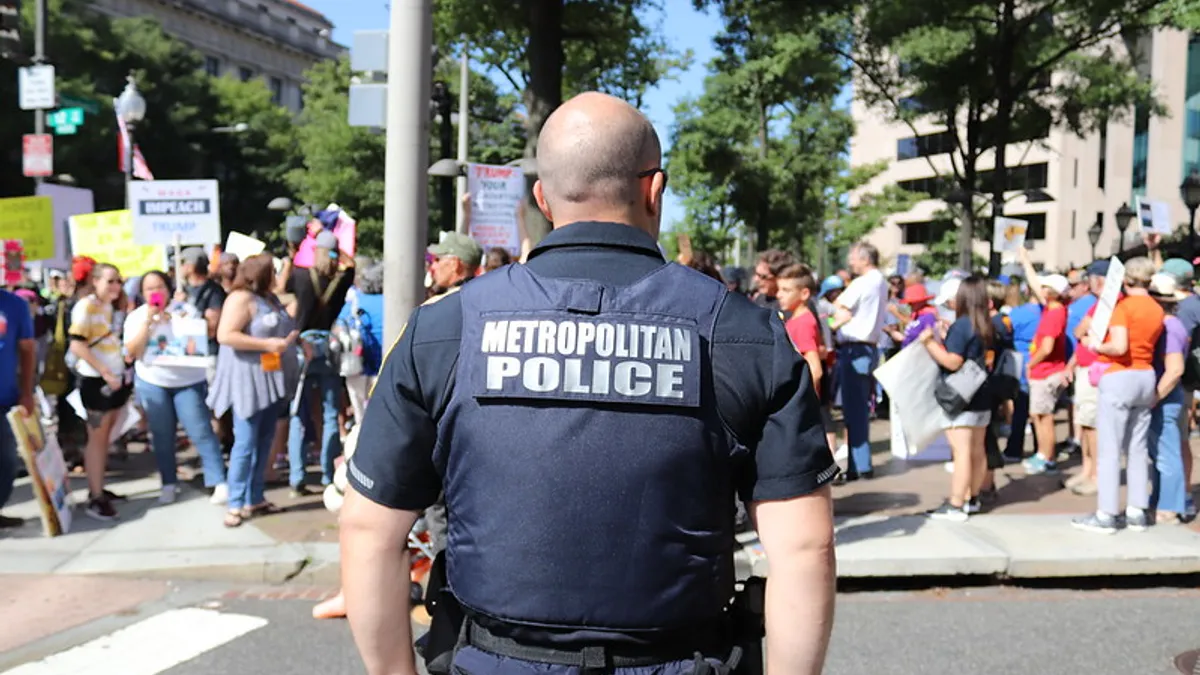From Columbus, OH to Oakland, CA, voters weighed in on 20 police-related ballot measures this week to address oversight and reform in the wake of police killings and protests that shaped the nation in 2020. In at least 10 of those cities and counties, the measures have passed with vast approval.
"In my career, I've never seen anything like this [in regards] to the current conversation," said Maureen McGough, the Policing Project's chief of staff at the New York University (NYU) School of Law. "The steps that you see being taken, they're really important steps, but they're really only part of the solution and we've got a lot of work to do regardless of how much progress we just made."
In Columbus, about 74% of voters approved the city's Civilian Police Review Board and Inspector General Charter Amendment, marking a historic first step toward police reform in the city. The charter amendment will create a civilian police review board that can investigate alleged police misconduct and "appoint and manage" a newly-created Inspector General for the Division of Police.
As we wait for national results, we know that Columbus voters spoke loudly and clearly – they are ready for reform within the Division of Police. Issue two puts more power in the hands of residents to hold our division of police accountable for misconduct. 1/3 pic.twitter.com/KBbdHeeHDt
— Shannon Hardin (@SG_Hardin) November 4, 2020
Mayor Andrew Ginther, who said he does not support defunding the police, told Smart Cities Dive in an earlier interview that he favors the Columbus Division of Police adjusting its operations to meet community expectations. "I want to go from a mid-20th century law enforcement agency to a 21st century community policing organization," he said at the time.
The outcome of the other police oversight ballot measures across 10 cities and counties, according to Bloomberg Government and Ballotpedia, are as follows as of publication:
PASSED: Oakland, Measure S1
About 81% of Oakland voters approved Measure S1, which changes the staffing, power and duties of the Oakland Police Commission and the Community Police Review Agency. The measure also creates the Office of the Inspector General to oversee the commission and agency.
PASSED: San Diego, Measure B
About 75% of voters assented to amending the city charter to replace the Community Review Board on Police Practices with the city council-appointed Commission on Police Practices, which can investigate deaths and complaints related to police officers.
PASSED: San Francisco, Proposition D
With 67% of voters in favor, San Francisco will create the Sheriff's Department Oversight Board, which will have the authority to report findings and recommendations to the San Francisco Board of Supervisors. The vote also created the Sheriff's Department Office of Inspector General, which can investigate in-custody deaths, suggest policy changes and more.
PASSED: San Jose, CA, Measure G
About 78% of voters approved giving the city's police auditor new powers, including the ability to make policy suggestions to the police department and review reports related to police officer-related shootings.
PASSED: Sonoma County, CA, Measure P
A majority (66%) of voters approved a measure to update the powers of the Independent Office of Law Enforcement Review and Outreach, including authorizing access to all evidence in investigations, recommending disciplinary actions for certain officers and more.
PASSED: Portland, OR: Measure 26-217
About 82% of voters approved a charter amendment to create a new police oversight board, which will have the ability to investigate complaints made against the police, request evidence, recommend policy and impose disciplinary action on officers, including termination.
PASSED: Philadelphia, Question 3
A majority of voters (about 78%) agreed to a question creating the Citizens' Police Oversight Commission. Vanessa Garrett Harley, deputy managing director for Philadelphia's Office of Violence Prevention, said in an earlier interview it would have more teeth than the city's current advisory commission when it comes to police transparency and accountability.
PASSED: Pittsburgh, Independent Citizen Police Review Board Charter Amendment
About 78% of residents voted in favor of a charter amendment to require police officers to cooperate with the Pittsburgh Independent Citizen Police Review Board investigations, with termination as a penalty for not cooperating.
PASSED: Kyle, TX: Proposition D
Eighty-nine percent of voters opted to support a proposition authorizing the Kyle, TX City Council to establish a committee to review police department policies, order the police to engage with the community on social media and more.
PASSED: King County, WA, Charter Amendment 1 and Charter Amendment 4
A big majority (82%) of voters in King County, WA agreed to Amendment 4, which authorizes the Office of Law Enforcement Oversight to subpoena witnesses and evidence for investigations. And over 80% voted in favor of Charter Amendment 1, which mandates investigations into all deaths related to police officers, in addition to providing a public attorney for the family of the deceased in an investigation.
'Moving in the right direction'
Voters also weighed in on non-oversight reform measures, including an end to stop-and-frisk in Philadelphia, the removal of a mandatory police staffing level in San Francisco, and requiring that no less than 10% of the Los Angeles County general fund budget be allocated to incarceration alternatives and other initiatives.
The success of police oversight and reform ballot measures also comes as cities have largely fallen short in meeting the demands to reduce or eliminate police department funding. In fact, 17 of the 33 major cities that adopted FY21 budgets in July and October have increased police department budgets, according to a Smart Cities Dive analysis.
And as the momentum for more police oversight potentially continues, experts noted that such efforts are not always created equal. The type of oversight, the available funding and the extent of power the oversight body have are critical to achieve democratic policing, according to McGough.
"We're definitely moving in the right direction, but it’s important to think critically about what that oversight looks like and maximize the chance that it's actually effective," she said.




















